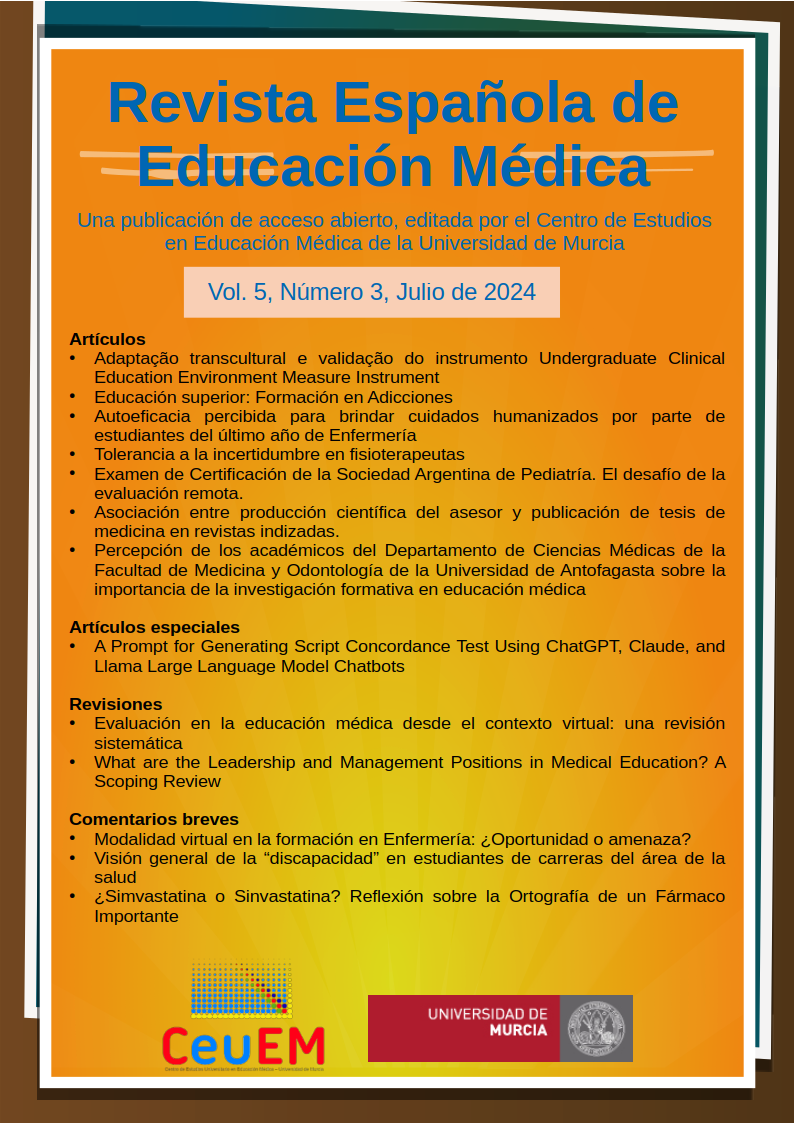Perception of academics from the Departament of Medical Sciences of the Faculty of Medicine and Dentistry ofe the University of Antofagasta on the importance of formative research in medical education
Abstract
Formative research consists of the development of research skills in students. This implies the existence of a teacher who has the necessary skills in the area [1]. The general objective of the research was to describe the perception of academics from the Department of Medical Sciences of the Faculty of Medicine and Dentistry of the University of Antofagasta about the importance of formative research in medical education. Descriptive and cross-sectional study that included 27 academics out of a total of 42 (64.2%). The questionnaire was structured in the following dimensions: formative research in medical education and teaching strategies; and activities related to formative research. The response category “Very important” obtains the highest value (54%) in the statement that consulted about the Development of research skills in medical students during their undergraduate training. The response category “Very important” records the highest value in the statement that consulted on Discussion of clinical cases (79%). Academics value formative research, in accordance with the requirements of the National Accreditation Commission of Chile (CNA), recognizing the role of different milestones, actors involved and teaching strategies.
Downloads
-
Abstract355
-
pdf (version 2) (Español ...251
-
pdf (version 2)251
-
Anexo I (Español (España))25
References
Cuadros L, González M, Mango P, Turpo O. La investigación formativa en la universidad: sentidos asignados por el Profesorado de una Facultad de Educación. Educação e Pesquisa, 2020, 46, 1-19. https://www.scielo.br/j/ep/a/bvYGHxgCpxB8sKNNp6zd3sN/
Alatrista Gutiérrez M, De la Cruz Vargas, J. Investigación formativa en medicina y ciencias de la salud. Revista de la Facultad de Medicina Humana 2017, 17 (3), 70–74. https://revistas.urp.edu.pe/index.php/RFMH/article/view/1070/6094
Parra Moreno C. Apuntes sobre la investigación formativa. Educación y Educadores 2004, 7, 57-77. https://educacionyeducadores.unisabana.edu.co/index.php/eye/article/view/549/642
Arista S, García N, Gómez I, Paca N, Valdez I. Investigación formativa en el desarrollo de habilidades comunicativas e investigativas. Revista de Investigaciones Altoandinas 2018, 20 (1), 125-136. http://www.scielo.org.pe/scielo.php?script=sci_arttext&pid=S2313-29572018000100012
Valero Anco V. La investigación formativa en la universidad. Revista Latinoamericana Ogmios 2021, 1 (1), 7-8. https://idicap.com/ojs/index.php/ogmios/article/view/9/16
Soto Suazo M. Investigación formativa. Journal of Health and Medical Sciences 2022, 8 (3), 139-140. https://revistas.uta.cl/pdf/5/00-editorial%2083.pdf
Campos Olazabal P. La importancia de la investigación formativa como estrategia de aprendizaje. Revista Educare et Comunicare 2020, 8 (1), 88-94. https://revistas.usat.edu.pe/index.php/educare/article/view/397/1508
Costa Zamaniego C, Idrobo A, Ramón Salcedo I, Valle Vargas M. Habilidades blandas en la investigación formativa del estudiante universitario. Revista Latinoamericana de Ciencias Sociales y Humanidades 2022, 3 (2), 1201-1219. https://dialnet.unirioja.es/servlet/articulo?codigo=9585482
Carnero Sánchez M, Mazariego Flores E. Experiencia y percepción investigativa de los docentes de la Facultad de Medicina de la Universidad de El Salvador. Revista Estudios del Desarrollo Social: Cuba y América Latina 2022, 10 (1), 371-387. http://scielo.sld.cu/pdf/reds/v10n1/2308-0132-reds-10-01-e29.pdf
Medina Morales G. Percepción del profesorado y el alumnado universitario de la formación temprana en investigación científica. Revista Actualidades Investigativas en Educación 2020, 20 (3), 1 – 20. https://doi.org/10.15517/aie.v20i3.43674
Copyright (c) 2024 Servicio de Publicaciones de la Universidad de Murcia

This work is licensed under a Creative Commons Attribution-NonCommercial-NoDerivatives 4.0 International License.
The works published in this magazine are subject to the following terms:
1. The Publications Service of the University of Murcia (the publisher) preserves the economic rights (copyright) of the published works and favors and allows them to be reused under the use license indicated in point 2.
2. The works are published under a Creative Commons Attribution-NonCommercial-NoDerivative 4.0 license.
3. Self-archiving conditions. Authors are allowed and encouraged to disseminate electronically the pre-print versions (version before being evaluated and sent to the journal) and / or post-print (version evaluated and accepted for publication) of their works before publication , since it favors its circulation and earlier diffusion and with it a possible increase in its citation and reach among the academic community.



















